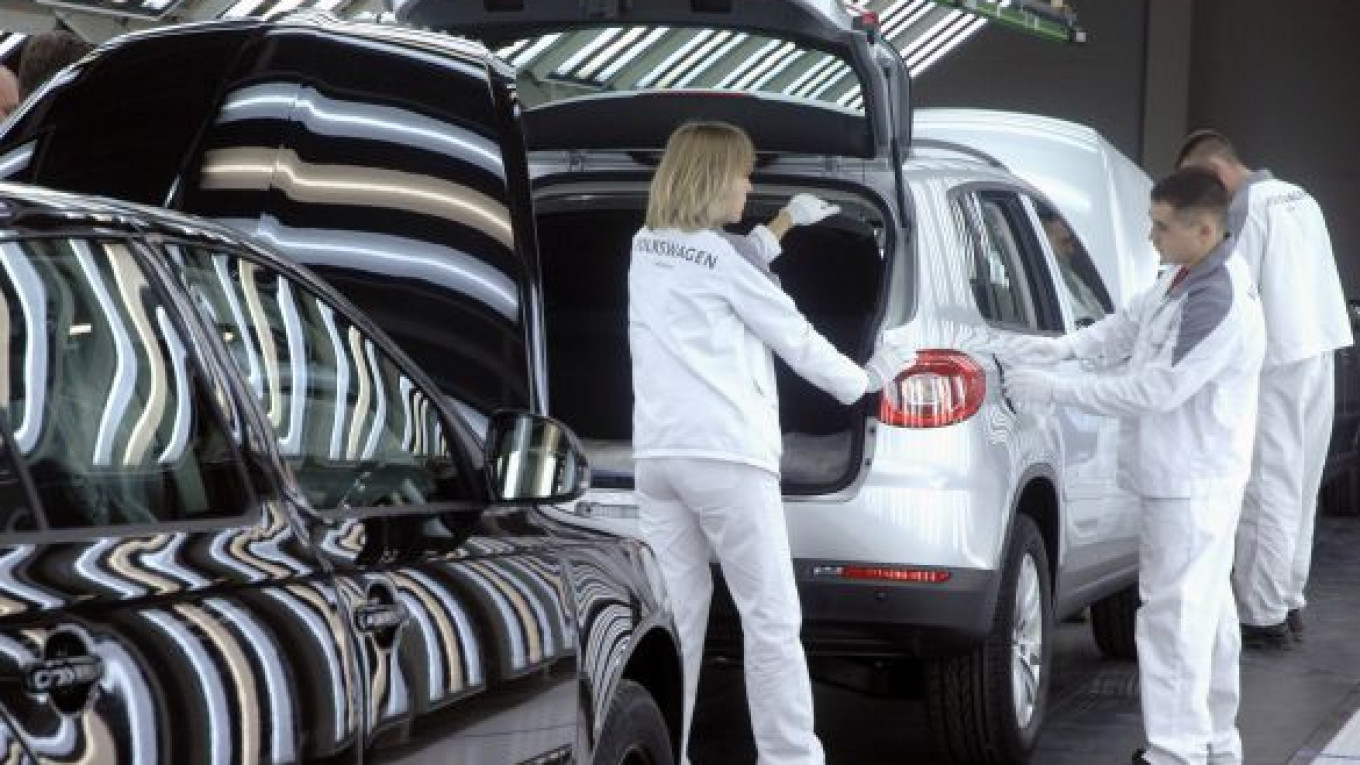Car exports from Russia to fellow members of the customs union increased sharply earlier this year, benefiting some of the foreign carmakers that set up production here, a top official of the group said in an interview.
The surge took place a half-year after Belarus and Kazakhstan abolished customs clearance in trade with Russia. The two countries then simultaneously raised import duties on a number of goods, including cars, to levels that were agreed on with Russia.
The value of Russian car exports to Kazakhstan expanded fourfold in the first quarter of this year compared with the same period last year, said Andrei Slepnev, trade minister of the Eurasian Economic Commission, the customs union’s executive body.
Exports to Belarus increased threefold.
“It’s a very good illustration of what is happening on the common marketplace,” Slepnev said.
Out of the total, foreign cars made in Russia accounted for 40 percent. They were mostly Hyundais from the plant outside St. Petersburg, Renaults from Moscow, Volkswagens from outside Kaluga and Chevrolet Nivas from Tolyatti.
Kazakhstan also received three times more rail and tram cars from Russia in the first quarter, year on year.
In general, the rate of trade growth among the customs union members, 17.5 percent in the first quarter, remained above the global level of 3 percent, Slepnev said.
It reached $16.3 billion in the period. The Eurasian Economic Commission didn’t report the value of Russian car exports.
Other changes included some import flows from China to central Russia, gravitating toward transit through Kazakhstan, Slepnev said.
“It makes the route shorter logistically,” he said. “It’s more convenient.”
This course of delivery competes with the popular gateway for incoming Chinese goods through the port of St. Petersburg.
Fellow union members have also stepped up efforts to lure foreign investment in local production by pointing to the new advantage of the bigger common market, Slepnev said.
“Some talks are already taking the dimensions of concrete agreements, in particular, contacts between Belarussian and Chinese companies,” he said.
Slepnev declined to name the companies but said they are in the automotive business.
Chinese automaker Geely plans to start production at a temporary plant in Belarus next year, and complete a $250 million plant there by 2015. Another Chinese carmaker, Lifan, agreed in December to set up a joint venture in Belarus.
Belarussian President Alexander Lukashenko has promised the “best conditions” to Chinese carmakers.
The Russian ambassador to Belarus, Alexander Surikov, last month expressed concern about the prospect of these cars entering Russia duty-free. They would have to have at least 50 percent of local content to accomplish that.
Slepnev said similar developments were taking place in Kazakhstan. Russia is by far the largest, and wealthiest, market in the customs union. But its taxes and bureaucracy are sometimes less competitive.
Given the stupendous speed of creating the customs union, businesses are in no rush to make use of the new opportunities, preferring instead to give them time to mature, Slepnev said.
“It’s quite reasonable and normal behavior,” he said. “Nevertheless, the first reactions are already there.”
One of the customs union’s priorities now is to adapt its external trade duties to the terms that Russia accepted for entry to the World Trade Organization. A decision is coming in the next few weeks, Slepnev said, in time for Russia’s expected accession in August or September.
A Message from The Moscow Times:
Dear readers,
We are facing unprecedented challenges. Russia's Prosecutor General's Office has designated The Moscow Times as an "undesirable" organization, criminalizing our work and putting our staff at risk of prosecution. This follows our earlier unjust labeling as a "foreign agent."
These actions are direct attempts to silence independent journalism in Russia. The authorities claim our work "discredits the decisions of the Russian leadership." We see things differently: we strive to provide accurate, unbiased reporting on Russia.
We, the journalists of The Moscow Times, refuse to be silenced. But to continue our work, we need your help.
Your support, no matter how small, makes a world of difference. If you can, please support us monthly starting from just $2. It's quick to set up, and every contribution makes a significant impact.
By supporting The Moscow Times, you're defending open, independent journalism in the face of repression. Thank you for standing with us.
Remind me later.






